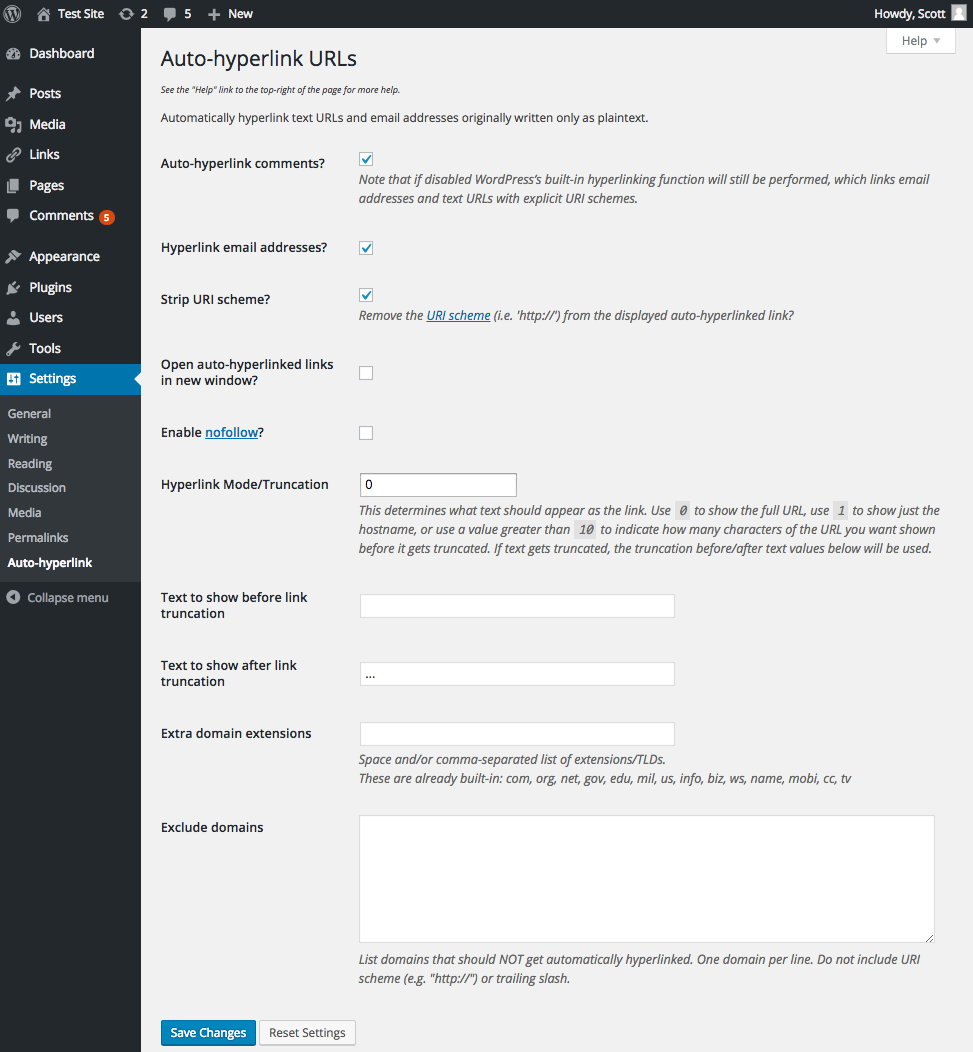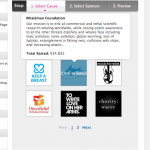Auto-hyperlink URLs Wordpress Plugin - Rating, Reviews, Demo & Download

Plugin Description
Automatically turns plaintext URLs and email addresses into links.
This plugin seeks to replace and extend WordPress’s default auto-hyperlinking function. This plugin uses different pattern matching expressions than the WordPress default in order to prevent inappropriate adjacent characters from becoming part of the link (as WordPress has improved over the years, nowadays this is just a few edge cases like text links that are braced or bracketed) and it prevents invalid URIs (i.e. http://blah) from becoming links.
More significantly, this plugin adds configurability to the auto-hyperlinker such that you can configure:
- If you want text URLs to only show the hostname
- If you want text URLs truncated after N characters
- If you want auto-hyperlinked URLs to open in new browser window or not
- If you want the URI scheme (i.e. “http://”) to be stripped for displayed links
- The text to come before and after the link text for truncated links
- If you want rel=”nofollow” to be supported
- If you wish to support additional domain extensions not already configured into the plugin
- If you want certain domains to be omitted from auto-linking
This plugin will recognize any explicit URI scheme (http|https|ftp|news)://, etc, as well as email addresses. It also adds the new ability to recognize Class B domain references (i.e. “somesite.net”, not just domains prepended with “www.”) as valid links (i.e. “wordpress.org” would get auto-hyperlinked)
The following domain extensions (aka TLDs, Top-Level Domains) are recognized by the plugin: com, org, net, gov, edu, mil, us, info, biz, ws, name, mobi, cc, tv. These only comes into play when you have a plaintext URL that does not have an explicit URI scheme specified. If you need support for additional TLDs, you can add more via the plugin’s admin options page or via filter.
This plugin also activates auto-hyperlinking of text links within post/page content.
Links: Plugin Homepage | Plugin Directory Page | GitHub | Author Homepage
Examples
(when running with default configuration):
-
“wordpress.org”
wordpress.org -
“http://www.cnn.com”
www.cnn.com -
“person@example.com”
person@example.com
To better illustrate what results you might get using the various settings above, here are examples.
For the following, assume the following URL is appearing as plaintext in a post: www.somelonghost.com/with/some/long/URL/that/might/mess/up/your/theme/and/is/unsightly.php
And unless explicitly stated, the results are using default values (nofollow is false, hyperlink emails is true, Hyperlink Mode is 0)
-
By default:
www.somelonghost.com/with/some/long/URL/that/might/mess/up/your/theme/and/is/unsightly.php -
With Hyperlink Mode set to 1
www.somelonghost.com -
With Hyperlink Mode set to 15
www.somelonghos… -
With Hyperlink Mode set to 15, nofollow set to true, open in new window set to false, truncation before of “[“, truncation after of “…]”
[www.somelonghos…]
Hooks
The plugin exposes a number of filters for hooking. Typically, code making use of filters should ideally be put into a mu-plugin or site-specific plugin (which is beyond the scope of this readme to explain). Bear in mind that most of the features controlled by these filters are configurable via the plugin’s settings page. These filters are likely only of interest to advanced users able to code.
c2c_autohyperlink_urls_filters (filter)
This hook allows you to customize which filters get processed by the plugin.
Arguments:
- $filters (array): The filters whose text should be auto-hyperlinked. Default
array( 'the_content', 'the_excerpt', 'widget_text' ).
Example:
/**
* Auto-hyperlink additional filters.
*
* @param array $filters
* @return array
*/
function my_c2c_autohyperlink_urls_filters( $filters ) {
// Add in another filter to process.
$filters[] = 'my_custom_filter';
return $filters;
}
add_filter( 'c2c_autohyperlink_urls_filters', 'my_c2c_autohyperlink_urls_filters' );
c2c_autohyperlink_urls_acf_filters (filter)
This hook allows you to customize which Advanced Custom Field filters get processed by the plugin. Note: the results of this filter are then passed through the c2c_autohyperlink_urls_filters filter, so ACF-specific filters can be modified using either hook.
Arguments:
- $filters (array): The ACF-related filters whose text should be auto-hyperlinked. Default
array( 'acf/format_value/type=text', 'acf/format_value/type=textarea', 'acf/format_value/type=url', 'acf_the_content' ).
Example:
/**
* Stop autolinking ACF text fields.
*
* @param array $filters
* @return array
*/
function my_c2c_autohyperlink_urls_acf_filters( $filters ) {
unset( $filters[ 'acf/format_value/type=text' ] );
return $filters;
}
add_filter( 'c2c_autohyperlink_urls_acf_filters', 'my_c2c_autohyperlink_urls_acf_filters' );
autohyperlink_urls_class (filter)
This hook allows you to customize the class added to links created by the plugin.
Arguments:
- $class (string): The class name. Default ‘autohyperlink’.
Example:
// Set default class for links added by Auto-hyperlink URLs.
add_filter( 'autohyperlink_urls_class', function ( $class ) { return 'myclass'; } );
autohyperlink_urls_link_attributes (filter)
This hook allows you to add custom attributes to links created by the plugin.
Arguments:
- $attributes (array): The link attributes already created by the plugin.
- $context (string): The context for the link. Either ‘url’ or ’email’. Default ‘url’.
- $title (string): The text for the link’s title attribute.
Example:
/**
* Output 'title' attribute for link, as done by plugin prior to v5.0.
*
* @param array $attributes The attributes for the link tag.
* @param string $context The context for the link. Either 'url' or 'email'. Default 'url'.
* @param string $title The text for the link's title attribute.
* @return array
*/
function add_title_attribute_for_autohyperlink_urls( $attributes, $context = 'url', $title = '' ) {
if ( $title ) {
$attributes['title'] = $title;
}
return $attributes;
}
add_filter( 'autohyperlink_urls_link_attributes', 'add_title_attribute_for_autohyperlink_urls', 10, 3 );
autohyperlink_urls_tlds (filter)
This hook allows you to custom the list of supported TLDs for non-URI scheme link auto-hyperlinking. Note that the value sent to the hook includes the default TLDs plus those added via the ‘more_extensions’ setting. Also note that the TLDs are defined as a ‘|’-separated string.
Arguments:
- $tlds (string): The supported TLDs. Default
'com|org|net|gov|edu|mil|us|info|biz|ws|name|mobi|cc|tv'.
Example:
// Add support for more TLDs.
add_filter( 'autohyperlink_urls_tlds', function ( $tlds ) { return $tlds . '|in|io|tt'; } );
autohyperlink_urls_truncate_link (filter)
This hook allows you to custom how truncated links are displayed.
Arguments:
- $url (string): The potentially truncated URL.
- $original_url (string): The full, original URL.
- $context (string): The context for the link. Either ‘url’ or ’email’. Default ‘url’.
autohyperlink_urls_custom_exclusions (filter)
This hook allows you to define custom logic to determine if a link should be hyperlinked.
Arguments:
- $should (bool): Should the link be hyperlinked? Default true.
- $url (string): The URL to be hyperlinked.
- $domain (string): Just the domain/host part of the URL.
Example:
/**
* Don't hyperlink links on the front page.
*
* @param bool $should
* @param string $url
* @param string $domain
* @return bool
*/
function my_autohyperlink_urls_custom_exclusions( $should, $url, $domain ) {
if ( is_front_page() ) {
return false;
} else {
return $should;
}
}
add_filter( 'autohyperlink_urls_custom_exclusions', 'my_autohyperlink_urls_custom_exclusions' );
autohyperlink_urls_exclude_domains (filter)
This hook allows you to specify domains that should not get auto-hyperlinked. Note that the value sent to the hook includes the value of the ‘exclude_domains’ setting. Note that only the domain (without URI scheme or trailing slash) should be specified.
Arguments:
- $excluded_domains (array): The domains already being excluded. Default empty array.
Example:
/**
* Exclude certain domains from being auto-hyperlinked.
*
* @param array $excluded_domains
* @return array
*/
function my_autohyperlink_urls_exclude_domains( $excluded_domains ) {
$excluded_domains[] = 'youtube.com';
$excluded_domains[] = 'example.com';
return $excluded_domains;
}
add_filter( 'autohyperlink_urls_exclude_domains', 'my_autohyperlink_urls_exclude_domains' );
autohyperlink_no_autolink_content_tags (filter)
This hook allows you to specify which HTML tags won’t get their content autolinked.
Arguments:
- $html_tags (array): The HTML tags that won’t get autolinked. Default
[ 'code', 'pre', 'script', 'style' ].
Example:
/**
* Allow text within the pre` to get autolinked, but don't allow text within
* blockquote to get autolinked.
*
* @param array $html_tags The HTML tags not to autolink.
* @return array
*/
function my_autohyperlink_no_autolink_content_tags( $html_tags ) {
// Tag that should get content autolinked, but that would otherwise be by default.
$html_tags = array_flip( $html_tags );
unset( $html_tags[‘pre’] );
$html_tags = array_flip( $html_tags );
// Tag that should not get content autolinked.
$html_tags[] = 'blockquote';
return $html_tags;
}
add_filter( ‘autohyperlink_no_autolink_content_tags’, ‘my_autohyperlink_no_autolink_content_tags’ );
`






